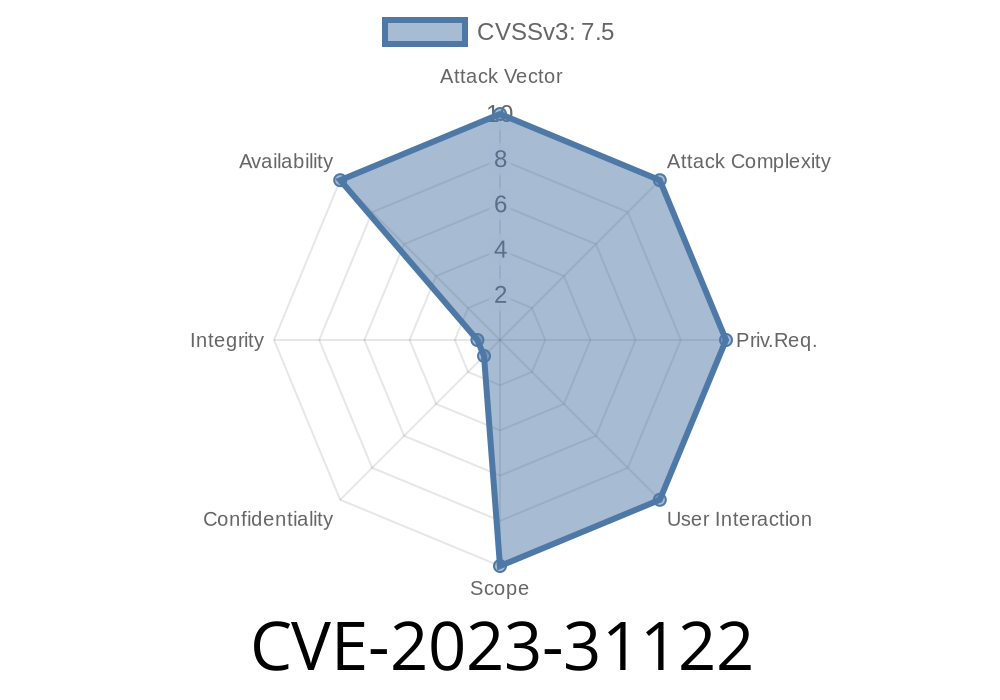At the heart of the internet, Apache HTTP Server is one of the world’s most popular web servers. Millions of websites and applications rely on it for safe, fast, and reliable content delivery. But as with all software, vulnerabilities creep in. One such issue is CVE-2023-31122, an out-of-bounds read bug in Apache’s mod_macro module, which affects versions of the server up to and including 2.4.57.
In this deep dive, we’ll break down what this vulnerability is, how it can be exploited, and what you can do to protect your servers. You’ll see code, references, and an easy explanation—even if you’re not a security expert.
---
What is CVE-2023-31122?
CVE-2023-31122 is an out-of-bounds read vulnerability found in the popular Apache HTTP Server. It specifically affects mod_macro, a module that lets server admins reuse chunks of configuration code via macros. Hackers can trick the server into reading memory outside the bounds of what's meant to be accessed.
Why Should You Care?
Even though this flaw doesn’t let an attacker run code by itself, leaking unexpected content (like memory addresses, previously processed data, or even configuration info) can help attackers understand your system better. It could be a “building block” for more serious attacks.
---
How Does the Vulnerability Work?
When Apache parses configuration files that use macros through mod_macro, it loops through macro parameters. Due to missing bounds-checks, Apache sometimes tries to read from a memory location it shouldn't, based on how many macro arguments were supplied by the admin in their config file.
If a malicious user can supply a crafted configuration, they could trigger this bug to read and potentially expose chunks of memory.
Module: mod_macro
---
The bug is in the macro expansion logic, specifically here
for (n = ; n < macro->argc; ++n) {
apr_table_setn(vars, macro->argv[n],
(n < argc - 1) ? argv[n + 1] : "");
}
Problem: There's no check to ensure that argv[n + 1] actually exists!
Consider a macro in your Apache config like this
<Macro FOO arg1 arg2>
# ... does something ...
</Macro>
Use FOO value1
Only one argument (value1) provided, though the macro expects two (arg1 and arg2). This will make Apache try to access a missing argument, reaching out-of-bounds memory.
---
The exploit requires control over the Apache config files.
An attacker who can upload or change the server’s configuration files (for instance, in shared-hosting environments or as a rogue admin) could exploit this bug to read sensitive memory. This isn’t a remote code execution flaw, but can allow information disclosure.
Macro does something, for example logs the values
Result:
The content of the missing argument might be pulled from nearby memory in the process, and (depending on how the macro uses it) could end up logged or otherwise exposed.
Here’s a minimal reproduction case for your server (for demonstration only)
LoadModule macro_module modules/mod_macro.so
<Macro PRINTARGS arg1 arg2>
LogLevel notice
CustomLog logs/macro_leak.log "%{arg1}e %{arg2}e"
</Macro>
Use PRINTARGS onlyone
When Apache reads this config, it’ll try to log arg2, reaching for “phantom” data in memory.
---
Original References
- Apache HTTP Server Security Advisory (CVE-2023-31122)
- Official Patch and GitHub Commit
- NVD CVE-2023-31122 Entry
---
Review Your Configs:
Limit the use of mod_macro and prohibit untrusted parties from editing your server’s config files.
Monitor Logs:
After patching, search old logs for exposure of weird or unexplained values—could be a sign of someone poking at this bug.
---
Conclusion
CVE-2023-31122 is an out-of-bounds read bug in Apache’s mod_macro, present up to 2.4.57. While it isn’t a direct “get root” hole, it can help attackers leak valuable bits of server memory if they get to edit your Apache configs. Fix it by upgrading to 2.4.58 or later and always limit access to your server’s configs.
Stay safe—and remember, your web server is only as secure as its weakest module!
If you found this helpful, check out the official Apache HTTP Server security page for the latest alerts and patches.
Timeline
Published on: 10/23/2023 07:15:00 UTC
Last modified on: 10/30/2023 17:54:00 UTC
